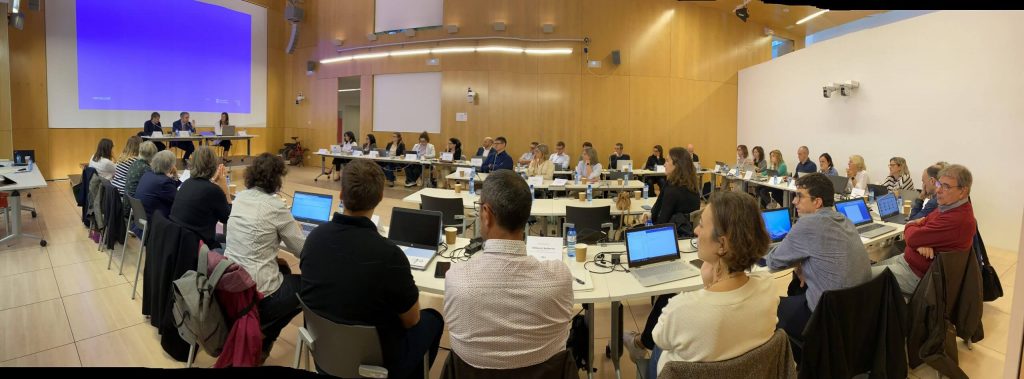Classical texts are a virtually inexhaustible source of references to continue helping us interpret our daily lives. In this case, I believe this Latin phrase well exemplifies the future challenge for research in our country.
Catalonia, within the Spanish State, is in a comfortable position compared to Spain as a whole when one looks at a variety of scientific indicators. Approximately 20% of Spanish publications come from Catalonia, yet qualitatively, Catalonia has a weight of approximately 40-50% in Spain as a whole in terms of highly cited articles, grants from the European Research Council and Severo Ochoa Centres of Excellence. Internationally, Catalan institutions are gradually becoming more visible in such areas as obtaining Horizon 2020 projects, and with the clear impression of gaining ground. Some illustrious Catalan researchers, such as Joan Massagué and Josep Baselga, both in the USA, also hold highly prestigious scientific positions in the world.
An easy option for Catalonia would be to remain as it is. But Spanish science, especially as directed from the Spanish ministries, needs to realise that it is in fact a huge Titanic, sinking little by little. Despite producing excellent researchers and ranking 10th in the world in terms of scientific production (according to SJR based on Scopus data), Spain is a black hole in terms of research management and funding. Many of us have experienced first-hand the cuts of up to 40% in Spanish research budgets, which nevertheless earmark significant amounts for military research, which has little impact on Catalonia. On top of this, the part of European ERDF funds given to the State and not the regions is unequally distributed, only reaching Catalonia in the form of crumbs. No to mention the uninspiring tax breaks for donations and patronage established in Spanish law, which are non-existent when it comes to R&D consortia. And lately, the swingeing revisions to projects funded by Spanish national plans already completed years ago, handed over to unscrupulous consultancies to recover/pirate money for the State coffers to make research funding even cheaper. And the icing on the cake, a VAT system that has simply created legal uncertainty, and not only in Catalonia. The Spanish Tax Agency has raised the amounts it collects by several million euros a year, through an obscure system with constantly changing criteria, whereby Catalan research institutions have stopped receiving considerable amounts from VAT rebates (several million euros a year) because their legitimate economic activity is not recognised by the tax administration. In addition, Spanish laws constrain the growth of public research institutions by restricting wage increases of more than 1%, regardless of the success of the activity.
However, Catalonia is a scientific-technological reality with much greater potential than that of the Spanish State. Never before have we had such well-trained students and researchers in science and engineering. So we have the right people (the most important factor!). For Catalonia, the real benchmark should be external. Countries such as Denmark, which has around 6 million inhabitants and produces around 1,000 more scientific articles than Catalonia each year (approx. 17,000) with a higher impact (citations/article obtained), should be our milestone. Together with Switzerland, Denmark leads Europe in citations per article in recent years and in 2016 it ranked 24th in the world in terms of scientific production. In 2007, the country reformed its university system, reducing the number from 25 to 8.
Like Denmark, Catalonia needs to remove bottlenecks to improve its competitiveness in research. University reform could play a decisive role in optimising public spending and assessing results. Also worth considering is rethinking the role of the different research management and assessment institutions, currently poorly coordinated and lacking competencies that have historically been left to the Spanish State (such as funding research projects), which should now be recovered. The spirit of Enric Prat de la Riba, attempting to build a country with a suitable institutional framework, should guide us once again. A law on science should be passed by the Catalan Parliament with the support of fair and adequate funding, a generous and incentivising law on patronage, and perhaps a new law on universities. In the new institutional organisation, the CSIC centres in Catalonia should be incorporated into the discipline and policy of research centres promoted by the Generalitat and, if necessary, initiate actions to rationalise and merge centres to make them more complete and competitive on the international scientific scene, always thinking in terms of adding rather than subtracting. Catalan science should be directly represented in the different international and European Union organisations and programmes. Living with intermediaries, as is the present case, is costly and inefficient. The participation of female researchers in positions of responsibility must be rebalanced. At present, female researchers account for less than 30% of the corresponding authors in Catalan scientific production (in-house data; BAC).
In the end, the issue comes down to a choice between the Titanic or Denmark. At this point, I believe the arguments point towards making a bold and confident move and laying the foundations for a firmer, more stable system for the future. There are 150 countries in the world behind Catalonia in terms of GDP. Why should it not be possible to choose “Denmark”? The path toward this is difficult, narrow and full of thorns, as they say in the classics, yet Catalonia can achieve true recognition of its excellence in research and, more importantly, benefit from the impact of the technology and good ideas generated by its researchers. And this would substantially lubricate and benefit the productive system, providing a new comparative advantage for Catalonia in the international macroeconomic context.
GenderTalent
Bruna Vives
18/11/2022
The CERCA Institute has launched ÀGORA, an unprecedented and innovative programme for the managers of CERCA centres. ÀGORA focuses on management training and strategic challenges in managing research and innovation.



